- Home
- Jane Smiley
Duplicate Keys
Duplicate Keys Read online
Jane Smiley
DUPLICATE KEYS
Jane Smiley is the Pulitzer Prize-winning author of A Thousand Acres and more than ten other works of fiction, including Horse Heaven, Moo, and The Greenlanders. In 2001 she was inducted into the American Academy of Arts and Letters. She lives in northern California.
ALSO BY JANE SMILEY
FICTION
Good Faith
Horse Heaven
The All-True Travels and
Adventures of Lidie Newton
Moo
A Thousand Acres
Ordinary Love & Good Will
The Greenlanders
The Age of Grief
At Paradise Gate
Barn Blind
NONFICTION
A Year at the Races
Charles Dickens
Catskill Crafts
Contents
Cover
About the Author
Other Books by this Author
Title Page
Dedication
Chapter 1
Chapter 2
Chapter 3
Chapter 4
Chapter 5
Chapter 6
Chapter 7
Chapter 8
Chapter 9
Chapter 10
Chapter 11
Chapter 12
Chapter 13
Chapter 14
Chapter 15
Afterword
Copyright
For Althea Jompen Frew and JTH,
duplicates, with affection
1
“I HAD a key. I was there to water Susan’s plants, but I’ve always had a key. Each of the guys in the band would have one, and other friends, too.” Across from Alice, Police Detective Honey jotted something on a pad. When he moved his hand, Alice read, upside down, ? keys out. She said, “Once on the subway I overheard a guy with a suitcase say to someone else, ‘Richie knows a place where we can sleep. He’s got a key.’ I didn’t know any Richie, but I can’t say I was surprised when the guy on the subway turned up at Susan’s apartment a day or so later, and let himself in. He wasn’t a bad kid. I mean, he came to Manhattan to take a management trainee job with RCA, but nobody knew him, and he did have a key.”
Detective Honey looked at her attentively, but didn’t write anything down. In the years Alice had lived in New York, she had never actually spoken to a New York cop. Although reassured by his wide, bland face, she wondered if he was on the take. She coughed into her hand, which was trembling, and went on as if with a psychiatrist. “It took a long time for the implications of that to faze Denny and Susan, and by that time everyone had a key. Then they talked about changing the locks, but it was a lot of money and trouble, and anyway, Denny was afraid of seeming hostile.” Detective Honey grimaced and shook his head. Alice said, “I thought it was stupid, too.”
“You were watering the plants, Miss Ellis?”
“Mrs. I was supposed to. I told Susan I would come every three days, even if the, uh, men were around, because she didn’t really trust them to keep everything watered. Maybe you saw that she has beautiful plants.” Thinking of the plants made her think of Denny and Craig. She winced. Detective Honey said, “And Miss Gabriel is where?”
“In the Adirondacks. She should be home tomorrow night.”
“In the Adirondacks in May?”
“She usually goes at odd times of the year. There’s a cabin she rents, and it’s too expensive in the summer.”
“Have you accompanied her to this cabin?”
“No one has. It doesn’t even have a telephone, and you have to hike in about three miles. Anyway, she hasn’t ever really invited anyone. I think she likes the break.”
“The break?”
Alice sat up straighter. “Well, getting away. You know. She’s a very busy person, dealing with customers all day, and—” Her voice faded.
Detective Honey touched the tip of his pencil to the notepad, then suggested, “So you were there on Wednesday, and came back today?” All of his questions were mere suggestions posed with studied casualness that convinced Alice she was a suspect and made her feel craven. “I was there on Tuesday, actually, but I couldn’t get back till today.” She cleared her throat. “I left my place about ten or ten-fifteen. I walked down Broadway, and bought a paper at Seventy-ninth Street. The vendor knows me. It’s ten blocks from my place, so it must have taken me about twenty minutes. I didn’t see anyone. I let myself in, because there isn’t a doorman, and went up the elevator to the sixth floor. I’ve been in that building almost more than I’ve been in my own, so I’m very familiar with everything about it. Nothing was different. I mean, out of place or anything.” Honey drew his left hand across the paper and wrote behind it. “I opened the door. Everything was very neat.” With the light streaming in, arrowing among the spikes of succulents, the ivy vines, the heavy, glossy leaves of avocados, the silvered masses of cyclamen, the rosy coleus. Drapes open, skylights blue with sunshine. Alice swallowed, but something in her throat would neither go down nor come up. The detective said, “Did you step into the room before you saw them?”
“They were sitting in chairs. I didn’t expect to see them at all. I thought they had a gig somewhere up near Boston.” Honey pushed her cup of coffee a few millimeters toward her and said, “As they were found by Officer Dolan?”
Alice nodded. “I said, ‘Hi!’ Just like that. ‘Hi!’ I was glad to see them.” The cheery greeting had resonated almost visibly in the air of the room, so that Alice had heard it and heard it the whole time she was looking. Somehow the riveting sight was not their ravaged faces, but Craig’s foot half out of his boot, so that it looked broken or deformed. It took her a long time to realize that he must have been in the act of pulling his boot off when the shot was fired. Honey flipped back a page or two in his notebook. Alice said, “I didn’t touch anything.”
“Call received at eleven twenty-eight. That’s approximately an hour, Miss Ellis.”
“It is?”
“What did you do after discovering the victims?”
“I think I stood there for a long time, but I don’t know how long. Then I walked around the apartment.”
“And yet you say that you didn’t touch anything?”
“I kept my hands in my pockets. I didn’t want to touch anything. I didn’t even want to breathe.”
“You put in your call from?”
“From Broadway, but I had to walk down a few blocks to find a phone that was in order.”
“So you were alone in the apartment for approximately half an hour?”
“I suppose, yes.”
Honey made marks on his pad, inhaling one large disapproving breath that seemed to drain the small office of oxygen. Alice said, “Maybe you don’t understand how shocked I was. I’ve never seen a corpse. All my grandparents are still alive. We never even had a dog that died.”
“Did you notice anything at all that seems unusual? You were there a long time. Try to remember as carefully as you can. Perhaps you can call up a detail that you think you didn’t notice. The scene of a crime, Mrs. Ellis, can be remarkably eloquent, but even the well-meaning presence of an untrained or unobservant person can silence much of what it has to say.”
Pompous, Alice thought, but, rebuked, she blushed. “I should have turned right in the doorway and left?”
Honey shrugged his assent, but said only, “Please think as carefully as possible.”
“I was very upset.”
“But what did you see?”
Alice thought for a couple of minutes, but it was impossible to say. When she made herself recall the scene of the crime square inch by square inch, she couldn’t tell if she was merely seeing what she knew would be in Susan’s apartment. “Nothing comes
to me.”
Detective Honey cleared his throat. Alice wondered if he were about to run her in. Did the daughters of hardware store owners from Rochester, Minnesota, actually wind up in Women’s Detention for stumbling upon murder victims? It was not something you learned about, in the end, from reading Kafka, or The New York Times. He said, “Perhaps you could tell me something about yourself, then, Mrs. Ellis.”
“The smell was very sharp. I was upset and kind of physically shocked. My bones and muscles seemed like they were vibrating.”
“You are not a native New Yorker?”
Alice looked at him for a moment. Was it time to ask for a lawyer, cite Miranda, stand up and refuse to answer any more questions? But when she opened her mouth, she was naming herself, Alice Marie Ellis, divorced, no children, aged thirty-one, librarian, New York Public Library, main branch, 557 West Eighty-fourth Street, native of Rochester, Minnesota, mother nurse, father in hammers and hoses, former husband poet and college teacher. Resident in New York, six years, five of them at present address. No felonies, no misdemeanors, no car.
Detective Honey smiled for the first time, confidently, Alice thought. He was a big man, with the routine confidence of big men. Looking at him was difficult. Conjecture seemed to bounce back at her, like sunlight off the fender of a car. He said, “I’ll be in touch with you, Mrs. Ellis,” and stood up. Alice stood up, too, and then, almost immediately, she was outside, in front of the precinct station. It was a brilliant day, of breezy clarity and substantial warmth. On the fifth floor of the building across the street, yellow awnings bowed and popped in the wind, as if at the beach and not in the middle of Manhattan. In just this way she had stepped out of her building at ten or ten-fifteen this morning, paused and looked up at gray stone, sharp shadows, azure sky, happy that Susan would be home tomorrow. “Mmmm, what a day!” she had exclaimed, and a man walking by had smiled and nodded. It was the sixth beautiful day in a row.
Alice stood and stood, smack in the path of traffic into the station, not knowing what to think, gazing at the free air of the free city of New York, relishing, even after such a brief time in the station, her present freedom of choice, but also unable to step away from the security of the busy building. To her right, leafy and rolling beyond the tunnel of buildings, Central Park beckoned: the zoo, the Met, the Natural History Museum, vendors of hot dogs and felafel, renters of bicycles, roller skaters, swings and slides. She stood and yearned, stepped forth, turned left toward Broadway.
AS BEFITTED Denny and Craig’s small fame, there were only a few gawkers, and when Alice asked one what had happened, he only said, “Couple of guys murdered in there. On the top floor.”
“Does anyone know who they were?”
“Nah. Just some guys.”
However, there was a girl, stylishly dressed, with a camera, who could have been from Rolling Stone. Alice pretended to be a gawker herself, and didn’t ask. As she lingered, more people appeared, shaded their eyes, and stared up at the blank windows of the top floor. No curtains. Behind her, someone said, “Denny Minehart and Craig Shellady, I heard. They had that band, Deep Six.”
“Sounds sort of familiar.”
“A hit about five years ago, remember ‘Dinah’s Eyes’?” He hummed a musical phrase.
“Yeah, sort of. Don’t you wish you could fly up and look right in the window?”
Alice drifted over toward the photographer, framing a question that she undoubtedly wouldn’t ask. She had been party to Denny and Craig’s frustration for so long that she knew she couldn’t stand to risk the certainty that even after this, Rolling Stone didn’t care. But they always announced deaths, they always did. Denny and Craig could be sure of that.
“Dinah’s Eyes” had brought Denny and Craig to New York, and the rest of them had followed, for various reasons, but mostly because it seemed the natural thing to do, natural even for herself and Jim Ellis to come only out of friendship. A big advance, “real support” from the record company, the sure sense that this was it, and six years ago, not five. A picture in Rolling Stone, not the cover and not the center spread, but a half-page shot by the magazine’s second most well-known woman photographer, and two pages of print, with Deep Six in fancy type, grossly elongated blue letters dipping into the body of the article. The whole thing was framed and hung on the wall right between those two windows that everyone, including Alice herself, was now staring at. Between the windows was the best place for it, insisted Craig, because then the sun wouldn’t fade or yellow it. Sunlight was death to newsprint, said Craig, and although he had his doubts about hanging it on an outside wall, with the sudden changes in temperature and everything, it would be okay for a while. Craig didn’t actually live with Denny and Susan, but he might as well have, for he kept all of his instruments there, all of his best photographs, and his scrapbook of performance reviews. It was from that apartment and not his own one-bedroom on Amsterdam Avenue that he expected to rise through a skylight like a great bird into the firmament of rock and roll immortality. Denny didn’t mind, having lived with Craig off and on for more than twenty years.
Alice stood so close to the female photographer that she nearly got stepped on. She could have said to the photographer’s companion (a reporter?), “I found them, you know. I opened the door and noticed the smell, and there they were, sitting in Susan’s orange armchairs, and their heads were so odd and fleshy and red. Do you know how long it takes to realize that you are looking at a dead person, how slowly your mind inches up and over that concept, trying out this speculation and that one, a joke, a trick, a dream, going crazy, wrong apartment, I mean, for a minute I couldn’t stop thinking that they’d been hit by cars and come here to recover or something. It was too quiet and clean for such an event to have happened. I wandered around the apartment for half an hour before calling the police, and now I’m a suspect.” But the photographer deftly twisted a long lens off her camera and moved off with her companion toward Riverside Drive. And turning the corner from Riverside was Ray Reschley, the sound man. Brightly flushed in the manner of all pale, pale men, and eternally pudgy, Ray caught sight of her and lifted his hand to wave. Then, perhaps discerning from her solitude in the gathering crowd that her relationship to the victims was as yet unknown, he dropped his hand and avoided her with elaborate care, finally glancing around, and then mouthing, “My place, dinner.” Alice nodded. Almost immediately a rather drably dressed and very young kid with a notebook stepped up to Ray, and Alice realized that this must be the reporter, a reporter. Ray’s perfect pitch and excellent ear had made him rather famous for a sound man, in enough demand so that he could work year-round in New York and never go on tour unless as a special favor. Like Alice, like Susan, like Noah Mast, the bass player, Ray had come here originally just because Denny and Craig were being brought by the record company and it seemed like he might be able to find work, too.
Ray drew himself up, clasped his hands together, and proceeded to give an interview. More people gathered around him. Ray expanded slightly, let his eyes sweep the group, smiled once as if he knew something, and said, “No comment.” Simultaneously amused by Ray and sickened by the entire scene, Alice turned away from the group, from Susan’s building and enormous problem, and headed up Riverside toward Eighty-fourth Street, although what she would do there she hadn’t the least idea.
“YOU heard, then. Isn’t it amazing?” The door of Ray’s apartment was opened by Rya Mast, black shorts, black French T-shirt, bare feet. She moved backward dramatically, allowing Alice to enter. From across the room, her husband Noah barked, “Alice found them, Rya.”
“Noah never tells me anything. How awful for you. I won’t even ask you about it. You’d better have a drink.”
“She found them this morning, Rya.”
“You’d better have a drink anyway. Ray just went out to get dinner at the Chinese place on 105th Street, but he left a pitcher of piña coladas. Let me get you one.”
Noah rolled his eyes, but smiled when she re
turned. Alice took the foamy drink and sat down, resolving not to look up. The ceiling of Ray’s living room was a large smoked mirror.
“We’re just shocked,” said Rya, whose blond hair was wound on top of her head. If she unpinned it, it would fall down in a single shining mass, Alice knew. The only sense of expertise she ever got about Rya was when the other woman was arranging her hair or choosing clothes. “Just shocked, shocked. I can’t express it.”
“Astonished. Dumbfounded,” suggested Noah.
“Noah is shocked, too. Believe me. He teases to cover up.”
“Floored. Taken aback.”
“Don’t make us laugh, Noah. It’s awful.”
Alice had long ago arrived at a routine toleration of the Masts that enabled her to overlook Rya’s irritating coquettishness as well as Noah’s sarcastic manner. She was fond of them not only out of familiarity, but also for the countless jokes she had made at their expense over the years. Now she found them annoying, however, and regretted having come. In addition, she was afraid of having to describe what she had seen and of having to listen to the disgust of the others. Really, it was a burden to have to drag herself out of the bathtub, hunt for a cab, and endure an evening going over it all, but she hadn’t been able to keep herself from doing it. It was important to know something, perhaps only that it had really happened.
“Have you called Susan?” said Rya. “I can’t think of Susan.”
“She’s in the Adirondacks, remember?” Alice’s voice, unused since her conversation with Detective Honey, came out thick and quavering. She cleared her throat. She longed for Ray to return so that they could have the business of eating. Noah resumed rolling joints—tight, uniform, pointed like nails at each end. Alice sipped her drink. Rya’s gaze wandered upward, and then, underneath the smoked but revealing mirror, she rearranged her legs to better advantage and plumped her hair. There was no music. Listening to music was distressing to Ray, who heard every wrong note and mechanical waver in pitch. He preferred to save his ears for working hours, he said. Time off meant silence, silence so perfect that it was almost sexual. Sex-u-al. Sex, Ray maintained, was his only other interest besides perfect pitch. When he started talking like that, Alice was irked, knowing it was a pose, for Ray loved to build things and always had some project going, but in the last year or so his friends had changed. Now he went on rather tediously about his passion for sex, pure sex, no complications. Rya stood up as if the mirror were the gaze of God and went into the bathroom, closing the door behind herself. Noah glanced up and said, “How do you think she’s reacting?”

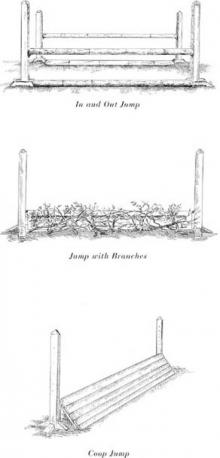 The Georges and the Jewels
The Georges and the Jewels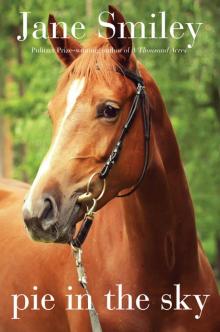 Pie in the Sky: Book Four of the Horses of Oak Valley Ranch
Pie in the Sky: Book Four of the Horses of Oak Valley Ranch Duplicate Keys
Duplicate Keys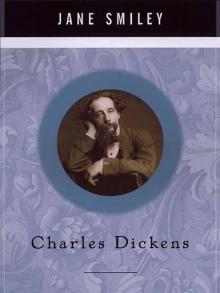 Charles Dickens
Charles Dickens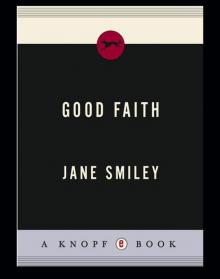 Good Faith
Good Faith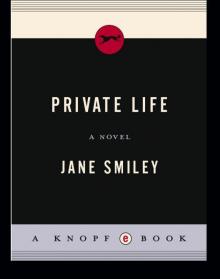 Private Life
Private Life A Thousand Acres: A Novel
A Thousand Acres: A Novel The Greenlanders
The Greenlanders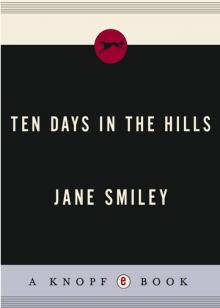 Ten Days in the Hills
Ten Days in the Hills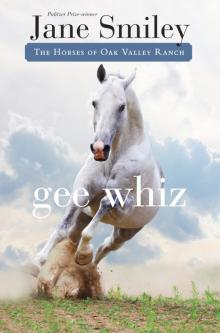 Gee Whiz: Book Five of the Horses of Oak Valley Ranch
Gee Whiz: Book Five of the Horses of Oak Valley Ranch A Thousand Acres
A Thousand Acres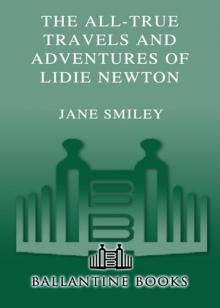 The All-True Travels and Adventures of Lidie Newton
The All-True Travels and Adventures of Lidie Newton Ordinary Love and Good Will
Ordinary Love and Good Will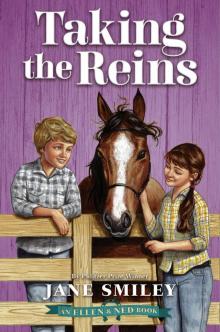 Taking the Reins (An Ellen & Ned Book)
Taking the Reins (An Ellen & Ned Book) The Man Who Invented the Computer
The Man Who Invented the Computer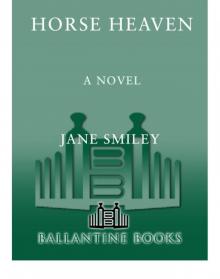 Horse Heaven
Horse Heaven The Age of Grief
The Age of Grief Riding Lessons
Riding Lessons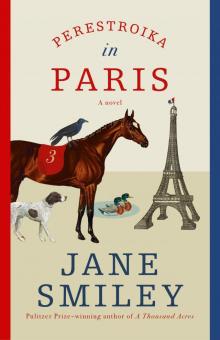 Perestroika in Paris
Perestroika in Paris A Good Horse: Book Two of the Horses of Oak Valley Ranch
A Good Horse: Book Two of the Horses of Oak Valley Ranch Saddles & Secrets (An Ellen & Ned Book)
Saddles & Secrets (An Ellen & Ned Book)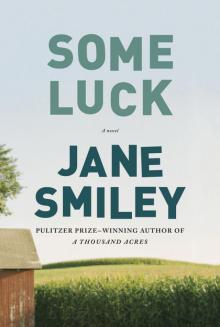 Some Luck: A Novel
Some Luck: A Novel Champion Horse
Champion Horse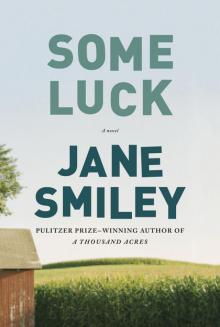 Some Luck
Some Luck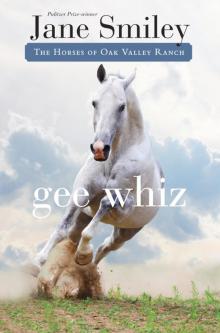 Gee Whiz
Gee Whiz Barn Blind
Barn Blind A Thousand Acres (1992 Pulitzer Prize)
A Thousand Acres (1992 Pulitzer Prize)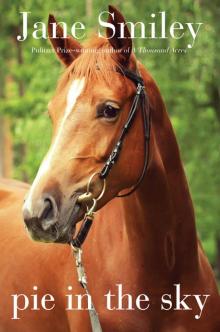 Pie in the Sky
Pie in the Sky True Blue
True Blue A Thousand Acres_A Novel
A Thousand Acres_A Novel A Good Horse
A Good Horse